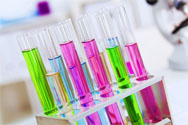您的位置:首页 > 产品中心 > Anti-KCa3.1 Antibody
Anti-KCa3.1 Antibody
产品别名
Anti-KCa3.1 Antibody
Intermediate conductance Ca2+-activated K+ Channel 4, SK4, IKCa1, KCNN4
基本信息
| eCl@ss | 32160702 |
| NACRES | NA.41 |
| Specificity【特异性】 | KCa3.1 (Intermediate conductance Ca2+-activated K+ Channel4, IKCa1, SK4, KCNN4) |
| Immunogen【免疫原】 | Synthetic peptide from the C-terminal area of rat KCa3.1 (Accession Q9QYW1). |
| Application【应用】 | Research Category Neuroscience Research Sub Category Ion Channels & Transporters Western blot: 1:300 using ECL on KCa3.1 transfected HEK-293 and K562 cells. Dilutions should be made using a carrier protein such as BSA (1-3%) Optimal working dilutions must be determined by the end user. SUGGESTED WESTERN BLOT PROTOCOL 1. Mix the samples (organ membranes: 50 μg/lane; transfected cells: 500,000 cells/lane) with sample-buffer X 2, and heat 10 min at 70°C. 2. 5-50 μL applied to Minigel lane (0.75-1.5 mm width) and run at standard conditions. (60 mA for 2 1.5 mm Minigel gels, 1.4 h). It is suggested that you run 5-15% acrylamide (37.5:1 acrylamide:bisacrysmide) minigel (1.5 mm width) at 30 mA/gel ~1-1.5 hours. 3. Transfer in semi-dry system under standard conditions (3 h 100 mA for two minigel gels) 4. Stain the transferred bands with Chemicon BLOT-FastStain (Catalog Number 2076). 5. Destain with deionized water.6. Block with 5% non-fat milk (Marvel or Carnation) in PBS, and 0.025 % sodium azide, overnight at 2-8°C. The non-fat milk should be dissolved freshly, centrifuged 10,000 rpm for 10 min, and filtered through glass filter (Gelman Acrodisc). 7. Incubation with first antibody 2 h at room temperature or overnight at 4°C in blocking solution. The antibody preparation should be centrifuged before use (10,000 g 5 min.). Optimal working dilutions and incubation time will need to be determined by the end user. 8. Wash 4 x 10 min. with PBS-0.1% tween 20. From this stage, azide should be omitted. 9. Incubation with the secondary antibody (HRP-conjugated goat anti-rabbit antibody, for example Chemicon Catalog Number AP132P, diluted appropriately) 1 h at room temperature. 10. Wash 4 x 10 min. with PBS-0.1% tween 20. 11. Perform ECL with commercial kits (Chemilucent, Chemicon Catalog Number 2600). Detect KCa3.1 using this Anti-KCa3.1 Antibody validated for use in WB. |
| Physical form【外形】 | Affinity purified immunoglobulin. Lyophilized from phosphate buffered saline, pH 7.4, containing 1% BSA, and 0.025% sodium azide as a preservative. Reconstitute with 50 μL of sterile deionized water. Centrifuge antibody preparation before use (10,000 xg for 5 min). |
| Analysis Note【分析说明】 | Control Included free of charge with the antibody is 40 μg of control antigen. The stock solution of the antigen can be made up using 100 μL of sterile distilled water. For negative control, preincubate 2 μg of peptide with 1 μg of antibody for one hour at room temperature. Optimal concentrations must be determined by the end user. |
| Other Notes【其他说明】 | Concentration: Please refer to the Certificate of Analysis for the lot-specific concentration. |
| Legal Information【法律信息】 | CHEMICON is a registered trademark of Merck KGaA, Darmstadt, Germany |
产品性质
| biological source【生物来源】 | rabbit |
| Quality Level【质量水平】 | 100 |
| antibody form【抗体形式】 | affinity purified immunoglobulin |
| antibody product type | primary antibodies |
| clone【克隆】 | polyclonal |
| purified by【纯化方式】 | affinity chromatography |
| species reactivity | human, mouse |
| manufacturer/tradename | Chemicon® |
| technique(s) | western blot: suitable |
| NCBI accession no.【NCBI登记号】 | NM_002250.2 |
| UniProt accession no.【UniProt登记号】 | O15554 |
| shipped in【运输】 | wet ice |
产品说明
| Storage and Stability【储存及稳定性】 | Maintain lyophilized material at -20°C for up to 12 months after date of receipt. After reconstitution maintain at -20°C in undiluted aliquots for up to 6 months. Avoid repeated freeze/thaw cycles. |
| Disclaimer【免责声明】 | Unless otherwise stated in our catalog or other company documentation accompanying the product(s), our products are intended for research use only and are not to be used for any other purpose, which includes but is not limited to, unauthorized commercial uses, in vitro diagnostic uses, ex vivo or in vivo therapeutic uses or any type of consumption or application to humans or animals. |




